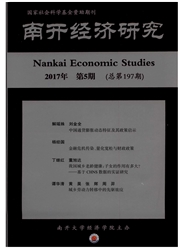

 中文摘要:
中文摘要:
使用“2005年全国1%人口抽样调查数据”和“中国住户收支调查数据”数据库,通过回归分解技术探讨了在控制年龄、性别、地区、受教育程度、行业等变量的前提下,劳动力人口流动对我国居民收入差距的影响。实证分析表明,忽视劳动力人口流动因素,将高估城镇居民收入水平和低估农村居民收入水平,从而夸大我国城乡居民收入差距,造成“推动城镇化就可以显著缩小居民收入差距”的政策误判。分析表明,要缩小我国居民收入差距,更应该把眼光放在如何缩小受教育度差异、地区差异和行业差异等相关措施上。
 英文摘要:
英文摘要:
Based on the"1%of 2005 National Sample Survey data"and“Chinese Household Income Project Survey data”, the article probes into the influence of population migration on Chinese income gap controlling for variables like gender, age, region, education and industry. Empirical analysis shows that the income of urban residents will be overestimated while the rural residents will be underestimated if failing to consider labor migration factors. It will trigger the exaggeration of the income gap between urban and rural residents and result in the policy misjudgment that promoting urbanization can significantly reduce the income gap. Analysis shows that to narrow the income gap of Chinese residents, we should look on how to narrow differences on education, regional differences, industry differences and related measures.
 同期刊论文项目
同期刊论文项目
 同项目期刊论文
同项目期刊论文
 期刊信息
期刊信息
